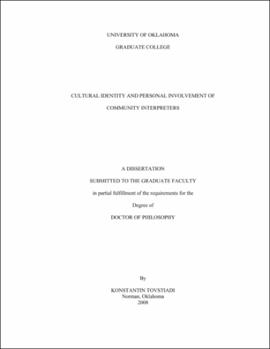| dc.contributor.advisor | Kramer, Eric M. | |
| dc.creator | Tovstiadi, Konstantin | |
| dc.date.accessioned | 2019-04-27T21:24:39Z | |
| dc.date.available | 2019-04-27T21:24:39Z | |
| dc.date.issued | 2008 | |
| dc.identifier | 99163981702042 | |
| dc.identifier.uri | https://hdl.handle.net/11244/318621 | |
| dc.description.abstract | The current study is based on 30 in-depth interviews with Russian professional interpreters. It addresses three broad questions: cultural identity, invisibility / involvement, and the relationship between the two. In doing so, it attempts to connect the literature in intercultural communication and in translation / interpreting studies and provide a foundation for interdisciplinary dialogue. | |
| dc.description.abstract | It was expected that cultural identity could be based on a single speech community, several communities, or on a transcendence of / denial by speech communities. The majority of respondents talked about an identity centered on their own culture. This is most likely the consequence of the monolingual / monocultural Russian society that although welcoming foreignness, usually reinterprets in its own terms. | |
| dc.description.abstract | Invisibility and involvement are about the perception of the interpreter's role as active or passive and the enactment of that role. Most interviewees saw invisibility as an ideal that is theoretically desirable but practically unattainable. They preferred to adjust the level of their involvement spontaneously based on the severity of the situation, rather than blindly follow a set standard. | |
| dc.description.abstract | It was expected that cultural identity will have an influence on the amount and the kind of the involvement performed by the interpreter. This expectation was not met, for several reasons. First, only one variation of cultural identity was present in the sample (an identity based on one community). Second, all the interviewees worked with English, a language of international communication where the cultural component was diluted and hence had little influence on the interpreters' identity. Third and most important of all, the interviewees showed a remarkable ability to separate their personal and professional lives (backstage and frontstage in Goffman's terms) and by doing so break the link between identity and action. | |
| dc.format.extent | 212 pages | |
| dc.format.medium | application.pdf | |
| dc.language | en_US | |
| dc.relation.requires | Adobe Acrobat Reader | |
| dc.subject | Translators | |
| dc.subject | Translating and interpreting | |
| dc.subject | Group identity | |
| dc.title | Cultural identity and personal involvement of community interpreters | |
| dc.type | text | |
| dc.type | document | |
| dc.thesis.degree | Ph.D. | |
| ou.group | College of Arts and Sciences::Department of Communication | |
